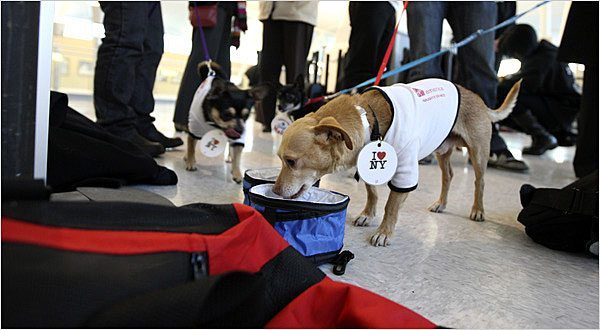If you like The Dog Files please join our Facebook Fan Page at http://www.facebook.com/dogfiles
Also, follow us on Twitter at http://www.twitter.com/dogfiles
By Manny Fernadez For The New York Times
A passenger in Seat 20E took a two-hour nap. A fellow traveler nearby named Malibu had trouble relaxing, and was given a mild sedative. A cross-country plane ride from San Francisco to New York City will do that to you — especially if you happen to be an eight-pound dog.
On Virgin America’s Flight 12, which arrived on Wednesday at Kennedy International Airport, there were 108 human passengers, three flight attendants, two pilots and nine Chihuahuas.
The dogs, joined later by six other Chihuahuas who made it to New York on another flight, sped down the Van Wyck Expressway that evening in two vans to their new temporary home on the East Side of Manhattan — the Adoption Center of the American Society for the Prevention of Cruelty to Animals, at 424 East 92nd Street.
Northern California it is not. The center is across from a few of the city’s public housing towers, where pit bulls and other large dogs have posed such a problem that officials made the controversial decision last year to ban them from similar complexes. Down the block, construction workers tore up the road with heavy machinery, Chinese-takeout deliverymen raced through red lights on their bicycles, and a man had transformed his white Volvo into a four-wheeled billboard, scrawling messages all over the car in black marker (“Support Your Local Nut,†one read).
Yet since arriving at the East Side shelter, the 15 Chihuahuas — Jeb, Orlando, Bella, Colette, the aforementioned Malibu, Annie, Bebop, C. J., Nala, Sherlock, Hancock, Honey, Tina, Holly and Maximus — have been adjusting to life in the big city. Some of them are living in fourth-floor condos (that’s what the A.S.P.C.A. calls its deluxe, glass-walled rooms), listening to classical music that is piped in and enjoying three walks outside and two feedings a day.
California, it turns out, has too many Chihuahuas. New York City does not have enough. So animal welfare officials in San Francisco and Manhattan arranged for what a Virgin America press release dubbed a “Chihuahua airlift†— 15 homeless dogs from the Bay Area were flown to Kennedy by the airline so they could be adopted by New Yorkers. It has been no small feat. The A.S.P.C.A. estimated that it would spend $100 to $2,000 per dog for spaying and neutering, shots, food, housing, veterinary care and other costs. At least one dog will undergo orthopedic surgery.
Virgin America donated roughly $12,000 in travel costs for the dogs and their human companions. None of the 15 Chihuahuas were at risk of being euthanized (no adoptable cats or dogs are put to death in San Francisco, only those with severe behavioral or health issues).
The Chihuahuas will be given behavioral as well as medical assessments, and a number of them will be available for public viewing and adoption on Wednesday at noon. “We expect them to take a little bit of time to adjust to the New York sights and sounds,†said Arthur Hazlewood, senior director of the Adoption Center.
Though this has long been a small-dog city (because it is a small-apartment city), the Chihuahua has never quite symbolized New York. “Beverly Hills Chihuahua,†the 2008 movie, has a certain ring to it that, say, “Brooklyn Chihuahua†lacks. Yet the breed has quietly earned a reputation as one of the most popular in the city.
About 101,000 dogs have licenses issued by the health department, but that’s a small percentage of the estimated 500,000 dogs in New York City. Among the licensed dogs, the Chihuahua is the fourth most popular breed, outranking the pit bull at No. 7, according to data from the city’s Department of Health and Mental Hygiene. The most popular is the mutt, followed by the Yorkshire terrier and then the Shi Tzu. The least popular is the Tibetan mastiff.
On Thursday afternoon, the 15 California Chihuahuas were spread out among three condos and four offices. In Room N, one of the fourth-floor condos, six Chihuahuas — including a well-rested C. J., the passenger in 20E — scampered around their wire pens. Each had a silvery water bowl and a necessary layer of restroom-style paper towels on the floor. They clamored for attention when Gail Buchwald, the center’s senior vice president, made a surprise visit. She let some of them loose. Jeb grew somewhat agitated after he saw a large dog strut down the hall, snapping at his fellow Chihuahuas.
It was only their second day in the city, but they were quickly becoming New Yorkers, meaning they were becoming more feisty, more resilient, more pampered and more, well, complicated. They have their own phone number at the Adoption Center (212-876-7700, extension 3210, the group’s Operation Chihuahua hot line). And there is even romance in Room N: Honey and Hancock have been inseparable, and snuggled up to each other in a pen while Jeb barked.
“Look at the way he’s looking at her,†Ms. Buchwald said of Hancock, his eyes wide, his tail wagging. “This is love.â€
The group hopes that Honey and Hancock will be adopted as a pair to keep them together.
One of the reasons for California’s large numbers of Chihuahuas is “the Hollywood effect,†said Rebecca Katz, acting director of San Francisco Animal Care and Control, which provided the 15 dogs and helped escort them on their flights. Chihuahuas have been the stars of movies, cartoons and fast-food commercials, and have become fashion accessories for celebrities, including Paris Hilton, who offered a $5,000 reward when her Chihuahua, Tinkerbell, was missing in 2004. Yet many California owners have given up their pets because they were ill-prepared to properly care for them, Ms. Katz said.
“Some of the Bay Area shelters are reporting that as much as 60 percent of their dogs are Chihuahuas or Chihuahua mixes,†she said.
At the Manhattan shelter, the opposite was true: The 15 Chihuahuas were the only Chihuahuas there. In the end, they and their kind were outnumbered by the shelter’s other occupants, the New Yorkers that C. J., Malibu and the rest will likely have the hardest time getting along with.
The cats.

